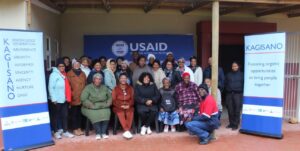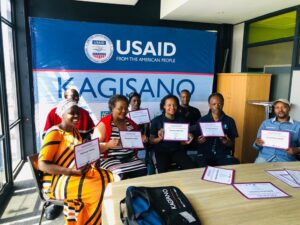
By Albert Mpazayabo
In the Western Cape Province, Kagisano Programme is implemented in four communities, namely De Doorns, Du Noon, Khayelitsha, and Masiphumelele. The present article focuses on Du Noon at large and De Doorns in particular.
In Du Noon, through Kagisano Programme facilitation services, around the programme main objective, which is to promote social cohesion through peace building and prevention of collective violence interventions, Du Noon Peacebuilders Team was established, and has been championing all efforts around the promotion and sustenance of social cohesion across Du Noon community, since July 2023 onwards.
In De Doorns community, Kagisano Programme is still in its initial stages of initiating contact with the community and stakeholders, mapping networks and dynamics, working towards fostering organic opportunities to bring De Doorns residents together, around areas of common concerns.
Nevertheless, all along the facilitations of the different stakeholder meetings proceedings, that have already taken place, more particularly around August – September 2023, Kagisano Programme in De Doorns serves as an example to the power of community-centred methods, in resolving conflicts and fostering peace in areas plagued by socio-economic challenges and cultural tensions.
De Doorns, historically marred by tensions and divisions, particularly around unemployment and the influx of migrant seasonal workers, finds itself facing a critical crisis. The arrival of these seasonal workers intensified by local grievances, often leads to mutual hostility and distrust between local residents and foreign nationals. This situation mirrors a broader challenge many communities face in South Africa, the struggle to integrate diverse populations harmoniously amidst local economic hardships.
The transformative impact of the Kagisano programme in De Doorns is not incidental but a result of strategic, well-thought-out community interventions. Key to this transformation is the programme’s focus on creating community safe space, through stakeholder meeting platforms, whereby different role players, operating from the four corners of such a given community, would be afforded a fair and conducive opportunity, to meet in one space, at one time, and freely discuss and make collective resolutions over community issues of common concern, within the programme’s framework, basically cultural dialogue, conflict management and resolution, and social cohesion. By facilitating open discussions and encouraging a deeper understanding of each other’s perspectives, the programme manages to shift previously negative perceptions of beneficiaries. This demonstrates that when communities engage in meaningful dialogue, they can break down barriers of misunderstanding and prejudice that often lead to conflict.
One notable outcome of the Kagisano programme is the considerable reduction in hostility between local residents and foreign nationals. A beneficiary of the programme in Du Noon shared,
“We are encouraging our African brothers and sisters, in our neighbourhoods, to make substantial efforts and integrate properly. Let them learn our languages and appreciate our local cultural values and customs. Let them teach us their skills, let us embrace one another as we share one humanity. Local integration is a mutual process, affecting both of us in one way or the other. Let us avoid self-isolation and rather reach out for one another, because at the end of the day, we are just one humanity. We are all Africans”
Another critical aspect of the programme is the emphasis on equipping community leaders with the skills and knowledge necessary to mitigate collective violence and promote social harmony. This capacity-building approach ensures that the community itself sustains the gains made through the programme, fostering a sense of ownership and responsibility for sustained peacekeeping efforts.
“Through the two training we have undergone in these few days, we feel well equipped with enough skills, our understanding has deepened, our knowledge has increased, we now perceive cultural differences not as a threat anymore, but as an asset and an innovative useful resource, which should benefit our neighbourhoods, as we learn about, and appreciate our differences. We have now acquired higher understanding and knowledge as to how detect, assess, manage and resolve conflict in more constructive ways, ways that prevent additional harm to both involved parties. Having said all that, we now perceive ourselves as champions of social cohesion in our Du Noon”, said a member of Du Noon Peacebuilders Team.

A key recommendation emerging from success of the Kagisano programme is the establishment of an effective, legitimate community umbrella leadership structure in De Doorns. Such a structure, serving as a coordinating body for all community development initiatives, would ensure that efforts are unified and impactful. The proposed leadership model underlines the importance of collective action and inclusive participation in addressing common concerns, thus providing a blueprint for other communities facing similar challenges.
The ongoing transformation in De Doorns is a powerful illustration of the effectiveness of community-centred methods in conflict resolution and peacebuilding. It underscores the potential of such approaches in other regions, offering a blueprint for community-driven development and harmonious coexistence. This case study demonstrates that when communities come together, focusing on shared goals and mutual understanding, they can overcome deep-rooted challenges and foster a more peaceful and inclusive society.
Albert Mpazayabo is the Kagisano Programme Officer in the areas of De Doorns and Du Noon.